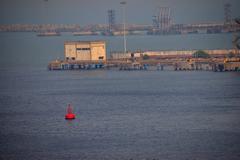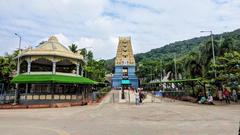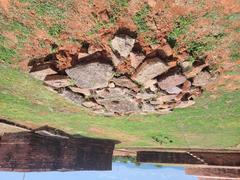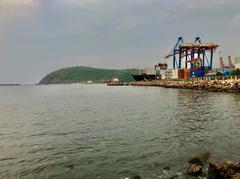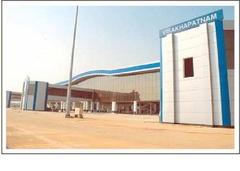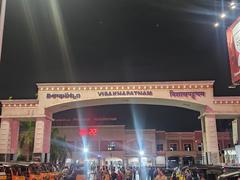Andhra University Visakhapatnam: Visiting Hours, Tickets, and Travel Guide
Date: 14/06/2025
Introduction: History and Significance
Andhra University, located in the scenic coastal city of Visakhapatnam, Andhra Pradesh, is a prestigious institution established in 1926. Founded during the British colonial era to serve the Telugu-speaking population, the university’s inception was championed by its first Vice-Chancellor, Dr. Cattamanchi Ramalinga Reddy, and greatly benefited from the generous support of King Vikram Deo Verma. Over nearly a century, Andhra University has grown into a major center for higher education, research, and cultural activity, blending colonial-era architecture with modern academic facilities across its 422-acre campus (Andhra University Wikipedia; AU Centenary Vision Document).
The university is recognized for its academic excellence, holding an A++ NAAC accreditation and ranking among the top institutions in India by the National Institutional Ranking Framework (NIRF) (Andhra University Wikipedia; Distance Education School). Its campus not only offers educational opportunities but also serves as a vibrant cultural and historical landmark, with notable buildings like the Arts College and Dr. V.S. Krishna Library reflecting its enduring legacy (Yo! Vizag Heritage; Distance Education School).
Quick Navigation
- Founding and Early Years
- Growth and Academic Expansion
- Modernization and National Recognition
- Societal Impact and Notable Alumni
- Cultural and Regional Significance
- Visitor Information: Hours, Tickets, Tours
- Campus Highlights & Nearby Attractions
- Practical Visitor Tips
- FAQs
- References
Founding and Early Years (1926–1947)
Established in 1926, Andhra University marked a pivotal point for higher education in South India. Its formation was driven by the vision to provide quality education to Telugu-speaking students in the Madras Presidency. King Vikram Deo Verma’s philanthropy ensured the university’s location in Visakhapatnam, with significant financial support at a critical juncture (Andhra University Wikipedia; AU Centenary Vision Document).
The university’s emblem, designed by Sri Kowta Rammohan Sastri, features the rising sun (knowledge), lotus (prosperity), swastika (benediction), ocean (vastness of knowledge), and serpents (wisdom), embodying its mission and values.
Growth and Academic Expansion (1947–1980s)
Post-independence, Andhra University expanded rapidly. The Colleges of Arts, Science, and Technology were established in the early 1930s, with the College of Arts & Commerce later forming a separate entity. The university played a major role in promoting arts, literature, and research, hosting cultural festivals and academic conferences that attracted intellectuals and artists from across India (AU College of Arts & Commerce; Yo! Vizag Heritage).
Modernization and National Recognition (1990s–Present)
Andhra University modernized substantially in the late 20th and early 21st centuries, diversifying into new disciplines such as Management, Engineering, Law, and Pharmacy. It comprises five colleges and four campuses, offering a wide spectrum of programs from undergraduate to doctoral levels (Campus Option).
As of 2024, Andhra University holds an A++ grade from NAAC (CGPA 3.74/4), and ranks 41st overall and 25th among universities in the NIRF rankings. Its College of Pharmaceutical Sciences is ranked 34th nationally (Andhra University Wikipedia). The university is noted for its central research facilities and robust distance education programs (AU Centenary Vision Document).
Societal Impact and Notable Alumni
The university has produced influential alumni in politics, science, arts, and business, including:
- N. T. Rama Rao (actor and former Chief Minister)
- Duvvuri Subbarao (former RBI Governor)
- Justice K. Amareswari (first woman judge, AP High Court)
- Grandhi Mallikarjuna Rao (GMR Group founder)
- Y. C. Simhadri (noted academic leader)
Faculty and alumni have contributed to public service, academia, and industry at the highest levels (Yo! Vizag Alumni; EduRank Alumni).
Cultural and Regional Significance
Andhra University is a hub for cultural events, public lectures, and regional celebrations. Its museums and galleries chronicle the heritage of Andhra Pradesh, and the campus is a focal point for community engagement and local development (Yo! Vizag Heritage; Travel India Guide). The centenary celebrations in 2026 will highlight its ongoing legacy (AU Centenary Vision Document).
Visitor Information: Hours, Tickets, Tours
Visiting Hours
- Monday to Saturday: 9:00 AM – 5:00 PM (check for updates during holidays or special events)
- Entry Fee: Access to the campus and museums is generally free. Special exhibitions or events may require tickets.
Guided Tours
- Guided tours are offered by the university’s tourism office or student volunteers. Prior registration is recommended.
- Tours cover architectural landmarks, museums, and key academic sites.
Accessibility & Facilities
- Campus is equipped with ramps and accessible paths.
- Public restrooms, cafeterias, and resting areas are available.
- Security personnel and information desks are present at main entrances.
Campus Highlights & Nearby Attractions
Architectural and Natural Highlights
- Arts College Building: A striking example of colonial architecture.
- Dr. V.S. Krishna Library: Houses rare manuscripts and a vast academic collection.
- Convocation Hall: Venue for major ceremonies.
- Visakhapatnam District Collector’s Bungalow: Adds historical ambiance to the campus (Yo! Vizag).
- Gardens and Bay Views: Enjoy coastal breezes and lush greenery.
Notable Landmarks
- Algorithm Block: Technology and computer science center.
- The Elements: Collaborative innovation space.
- Nagarjuna and Meta Hostels: Vibrant student communities.
Nearby Attractions
- RK Beach: Ideal for evening strolls and street food (Food and Travel Utsav).
- Kailasagiri Hill Park: Panoramic city and sea views.
- INS Kursura Submarine Museum: Unique maritime experience.
- Simhachalam Temple: Renowned spiritual site.
- Araku Valley & Borra Caves: Popular day trips for nature and culture.
Practical Visitor Tips
- Photo ID: Required for entry.
- Dress comfortably: Extensive walking is involved.
- Photography: Allowed outdoors; seek permission indoors.
- Food: Multiple canteens offer South Indian meals; nearby restaurants provide local cuisine.
- Accessibility: Ramps and elevators in major buildings.
- Transport: Easily accessible by auto, taxi, and public bus; parking available at main gate.
FAQs
Q: What are the campus visiting hours?
A: 9:00 AM to 5:00 PM, Monday to Saturday.
Q: Is there an entry fee?
A: General entry is free; some events may require tickets.
Q: How can I book a guided tour?
A: Arrange via the university administration or official website; advance booking advised.
Q: Are facilities accessible for differently-abled visitors?
A: Yes, with ramps, accessible paths, and restrooms.
Q: What is the best time to visit?
A: October to February, for pleasant weather and campus events.
Q: Can I visit hostels or academic buildings?
A: Access is restricted unless part of an organized tour.
References
- Andhra University Wikipedia
- AU Centenary Vision Document
- AU College of Arts & Commerce
- Yo! Vizag Heritage
- Campus Option
- Yo! Vizag Alumni
- EduRank Alumni
- Travel India Guide
- Yo! Vizag National Universities
- The Hindu - Geophysics Platinum Jubilee
- Distance Education School
- Sakshi Post - University Centennial
- Holidify - Visakhapatnam Attractions
- Careers360 - Facilities
- Food and Travel Utsav
- Hikersbay - Travel Information
- Andhra University Official Website
- Collegedunia - Campus Layout
Call to Action
Plan your visit to Andhra University today and immerse yourself in a legacy of academic excellence and cultural vibrancy. For the latest updates, guided tours, and event information, visit the official Andhra University website and download the Audiala app for real-time visitor guidance and exclusive content.
